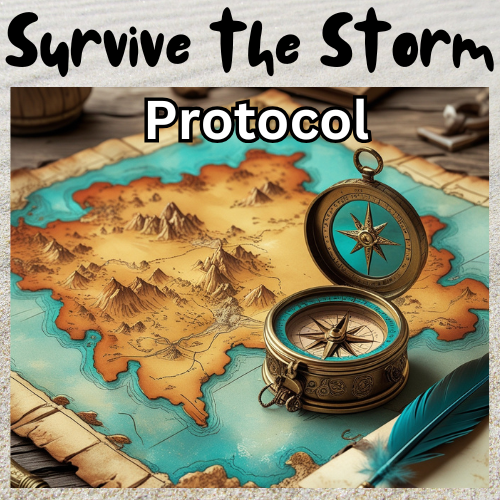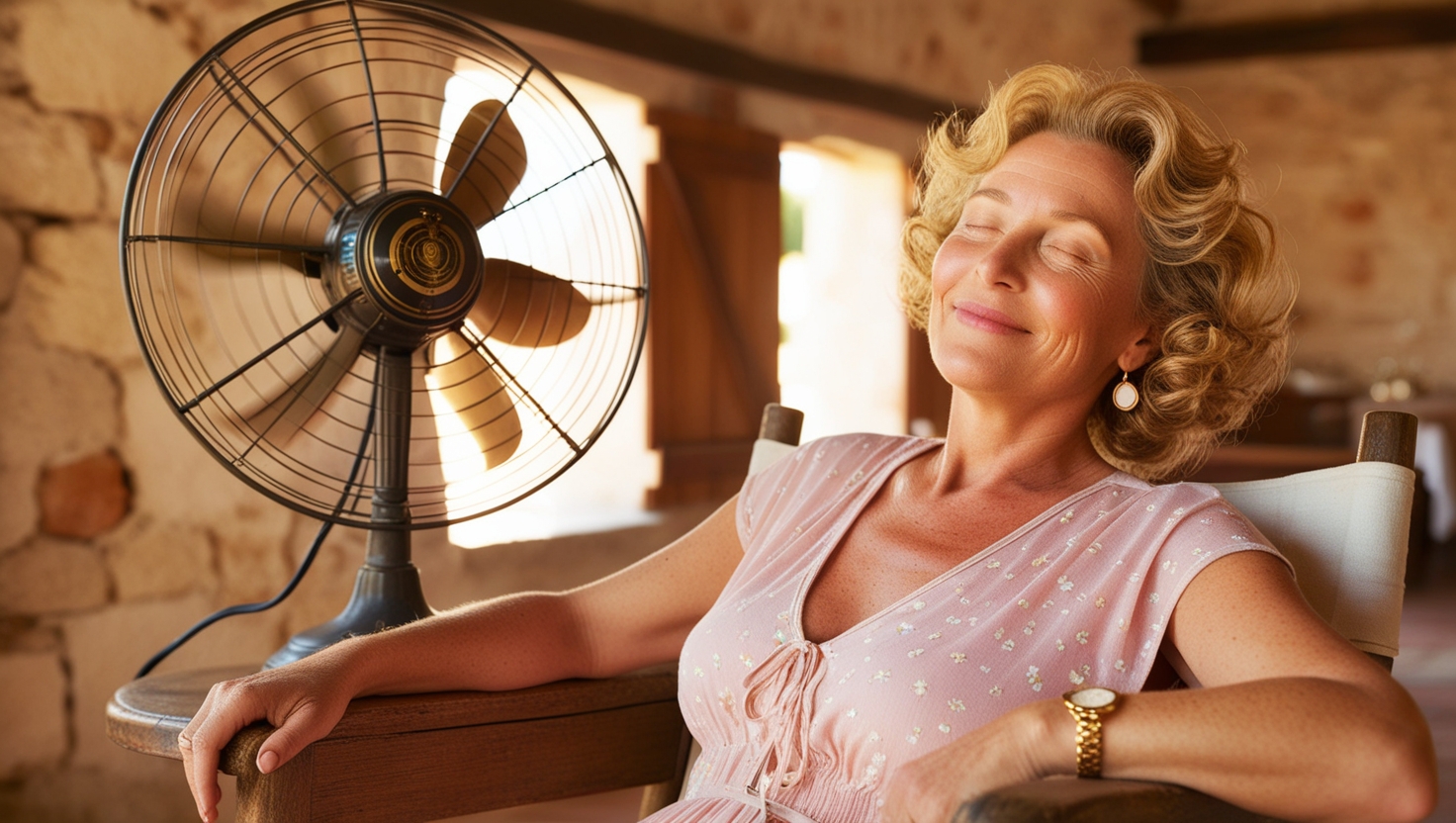Should you go on a Transformational Retreat during a Midlife Crisis?
#LifeQuake Series
Midlife Crisis or Midlife Awakening?
Why This Life Transition Is the Perfect Chance to Redesign Your Future
As life transitions go, a midlife crisis must be one of the most classical examples – it often marks a significant period of introspection during mid-adulthood. A midlife crisis is basically life yelling, “Plot twist!” Maybe it’s not exactly a “crisis” but a pivotal moment in your life, characterised by shifts in identity, priorities, and perspective.
Sure, the word crisis makes it sound like you’re about to ditch your responsibilities, dye your hair purple, and join a punk band called Existential Dread. But really, it’s just a dramatic way of realising that life is finite. This awareness can prompt deep self-reflection, leading you to question your choices, achievements, and direction.
Suddenly, you’re side-eyeing your choices, achievements, and that beige couch you swore you’d love forever. Cue the What am I even doing with my life? montage, starring you, a lukewarm cup of coffee, asking ChatGPT: “Can I start over at 40? 50? 60?”
A midlife crisis is like Marie Kondo-ing your identity. The roles you’ve collected over the years—Parent! Partner! Professional!—might not “spark joy” anymore and feel outdated and limiting. So, you start craving new labels: artist, adventurer, horse yoga enthusiast. This can result in a desire to break free from old definitions and explore new ones. It may inspire you to book a skydiving lesson or decide to become a TikTok star— as you question life’s meaning for you now.
Life transitions frequently stir up strong emotions, and a midlife crisis is no exception. One minute, it’s regret: Why didn’t I backpack through Europe when I had the chance? The next, it’s wild excitement: I could still backpack through Europe! It’s a rollercoaster of anxiety, restlessness, doubt, hope and maybe panic-buying a pink leather jacket. These emotional ups and downs are part of processing change and preparing to adapt to a new chapter.
At its core, a midlife crisis isn’t about losing your way; it’s about updating your map. Some go big—quitting their job, buying a convertible, moving to Bali. Others go small but mighty—picking up therapy, taking salsa lessons, or finally getting that sourdough starter. Either way, it’s not about escaping who you’ve been. It’s about embracing who you’re becoming.
So, if you find yourself in this transitional chaos, don’t panic.
At its core, a midlife crisis is about choice and change. Some people may make drastic changes—quitting a job, buying a sports car, or travelling the world—while others take quieter steps, like exploring therapy or adopting new hobbies. These actions reflect the transitional phase where people move from reflection to implementation, building a life that feels more aligned with who they’ve become.
Ultimately, a midlife crisis, like all life transitions, offers an opportunity for self-rediscovery and creating a more authentic, meaningful and fulfilling life.
The Midlife Pivot
What a Midlife Crisis Can Teach You About Priorities, Purpose, and Possibilities
One of my From Troubled to Triumphant: Finding Solid Ground During a Life Quake retreat guests, Barbara K. explained why she decided to attend a retreat here at my little French farmhouse:
“Listen, midlife and the menopause hit me like a freight train—and not one of those fancy bullet trains that glide in silently. No, this was an old-school, coal-belching locomotive with a blaring horn, zero warning, and a hypoglycemic conductor who probably skipped breakfast. One day, I was living my life, buying anti-wrinkle creams I didn’t really need, as you do, and the next? BOOM. My internal thermostat was shattered, my patience promptly evaporated, and sleep became an elusive ex-boyfriend who left without explanation.
So, let’s talk about this wild ride, shall we? Grab a fan (you’ll need it), pour yourself something calming (or alternatively, caffeinated), and buckle up for my hormone-fueled journey through hot flashes, mood swings, and the kind of fatigue that makes you forget why you walked into a room.
The Heat is On (All the Time)
Let’s start with the headliner: hot flashes. Whoever named them was being generous. These aren’t just flashes; they’re full-blown internal bonfires. One minute I’m watching Netflix, the next I’m frantically peeling off layers like I’m in some weird striptease competition. (Spoiler: first one naked wins.)
And it’s not just the heat—it’s the timing. Hot flashes don’t care if you’re in a Zoom meeting, at the grocery store, or trying to peacefully enjoy your kid’s piano recital. No, they’ll strike when they want, leaving you looking like you just ran a marathon in the Sahara.
Pro tip: Always have a handheld fan and a cool drink nearby. I now own more fans than Taylor Swift. (No regrets.) Oh, and if you see a middle-aged woman standing in the freezer aisle at the supermarket, mind your own business. She has her reasons, she’s fine.
Sleeping Beauty? Try Sleepless Beast.
Remember when sleep was easy? When your head hit the pillow, and eight blissful hours later, you wake up feeling like a fully functional human? Yeah, me neither.
Now, I spend my nights tossing, turning, and debating if I should just give up and start my day at 3 a.m. And the cherry on this insomnia sundae? The night sweats. Imagine waking up drenched, convinced your bed’s been transformed into a swamp. It’s delightful, really.
It’s not just the hot flashes. It’s the night sweats. And the racing thoughts. I’ll be lying there, minding my own business, when suddenly my brain decides to remind me of something embarrassing I said in 1998. Or I’ll start mentally reorganising the pantry at 4 a.m. because clearly, that’s urgent.
I’ve tried all the tricks—chamomile tea, white noise machines, lavender spray, meditation apps, even wearing socks to bed because someone on the internet swore it “regulates your body temperature.” (It doesn’t. It just makes your feet sweaty.) None of it worked. Then a friend recommended weighted blankets, and let me tell you, those things are magic. It’s like being hugged by a cloud. A really heavy cloud.
Eventually, I invested in moisture-wicking sheets and a cooling pillow. Do they solve anything? No. But they do make me feel like I’m sort of in control of my life again.
Mood Swings: Buckle Up, wannabe Survivors
Here’s the thing: I used to be a nice person. Ask my friends, my neighbours, even my cat. Now? One second I’m fine, the next I’m crying because a stranger on Instagram adopted a rescue dog named Pickles. (He looked so happy, okay?!)
My family has developed a sort of unspoken code for handling my moods. If I’m ranting about how nobody ever takes the bins out, my daughter quietly passes me a chocolate bar and backs away. It works like magic. My husband, bless him, meekly hands me the TV remote and retreats to the garage when he sees the telltale signs of an impending meltdown. Honestly? Smart moves all around.
Journaling has been surprisingly helpful for keeping the emotional rollercoaster in check. There’s something about scribbling down all my irrational frustrations that makes them feel… less intense. Plus, it keeps me from snapping at innocent bystanders, like the barista who accidentally gave me oat milk instead of almond milk. (I’m sorry, Greg. I was not myself that day.)
And yes, I’ve also started meditating. Don’t laugh. It’s not just for hippies and Gwyneth Paltrow. A few minutes of deep breathing can do wonders when you’re on the verge of throwing a loaf of bread at someone’s head. (Ask me how I know.)
But seriously, the mood swings are no joke. One day, I snapped at my son for leaving his shoes in the hallway. Ten minutes later, I was hugging hpm, apologising, and crying about how he’s growing up too fast. He looked at me like I was an alien. Honestly? Same.
Fatigue: When Even Coffee Can’t Save You
I used to pride myself on being the Energiser Bunny of my social circle. PTA meetings, book clubs, birthday parties? I was the queen of multitasking and late-night Pinterest scrolling. These days? If I manage to get through an episode of The Great British Bake Off without dozing off, it feels like a personal victory.
Fatigue during menopause isn’t your garden-variety tiredness. It’s the kind of exhaustion that makes you question if you’ve somehow been hit by a tranquiliser dart. I’ve nodded off at my desk, in the carpool line, and once—don’t judge me—at the hair salon while getting my roots touched up. (The stylist said I snored. Loudly.)
To combat this, I’ve become the weirdo who swears by naps. Naps are woke. I schedule them like meetings now. “Oh, you want to catch up at 3 p.m.? Sorry, I have a prior commitment.”
Exercise helps too, which feels unfair because who has energy for a brisk walk when you’re running on fumes? But weirdly, moving around does give me a bit of a boost. Sometimes I just dance in my kitchen to ’80s pop while yelling, “Staying Alive!” It’s not paricularly glamorous or elegant, but it makes me feel, well, alive. Of course, the first time I did yoga, I fell asleep during savasana. The instructor thought I was having a spiritual awakening. I was just done.
Food, Glorious Food (and the Occasional Meltdown)
Now, let’s address the elephant in the room: cravings. One minute you’re on a health kick, eating salads and drinking green smoothies. The next, you’re devouring an entire bag of chips while Googling “best chocolate cake recipes.”
I’ve learned to embrace balance. Yes, I eat my veggies. Yes, I indulge in the occasional midnight cheese toastie. And no, I don’t feel bad about it. Life’s too short to deny yourself carbs, especially when your hormones are already out here wreaking havoc.
That said, I do try to eat foods that help with symptoms. Lots of leafy greens, nuts, and omega-3s. And wine. (What? It’s made from grapes. Totally counts.)
The Silver Lining (Yes, There’s a very Thin One!)
Here’s the thing: as much as menopause can feel like a never-ending game of “What fresh hell is this?”, it’s not all bad. It’s kind of freeing, in a way. No more worrying about that time of the month. No more feeling like you’re at the mercy of your cycle. It’s like entering a whole new chapter of womanhood. One where you know exactly what you want (even if it’s just more naps and ice cream).
Plus, menopause has taught me to slow down and listen to my body. I’ve stopped trying to do everything and be everywhere. Instead, I focus on what truly matters—spending time with my family, finding joy in the little things, and embracing this beautifully chaotic phase of life. Menopause forces you to prioritise self-care, and let go of things that no longer serve you—like uncomfortable bras, people who drain your energy, and the out-of-touch-with-reality notion that women have to be “put together” all the time.
I’ve even started saying “no” to things I don’t want to do (frequently). It’s liberating. And while I may not have control over my hormones, I do have control over how I show up for myself.
I decided to attend a From Troubled to Triumphant retreat because it offered a rare opportunity to step away from the chaos and confusion of daily (mid)life and reconnect with myself in a meaningful way (I desperately needed to do that!) Walking the Camino in the serene beauty of southwest France provided a powerful setting for some serious thinking. The retreat guides you through a transformative process that blends physical exercise with emotional breakthroughs, helping you come to terms with the uncertainty of this life-shattering change. You’ll rediscover your purpose, regain your balance, and transition into your next chapter with renewed confidence.
So, to anyone else out there battling menopause: you don’t have to do this on your own. Whether you’re laughing through the tears or sweating through the laughs, just remember—you’ve got this. “

Author Bio: Dr Margaretha Montagu – described as a “game changer”, “gifted healer”, “guiding light” and “life-enriching author” – is an experienced medical doctor, a certified NLP practitioner, a medical hypnotherapist, an equine-assisted psychotherapist (EAGALAcertified) and a transformational retreat leader who guides her clients through life transitions – virtually, or with the assistance of her Friesian and Falabella horses, at their home in the southwest of France.
In a world that feels increasingly unstable — politically, economically, emotionally — what will you do when the rug is pulled out from under you? That’s why I created Survive the Storm — a 7-part online course designed to be a lifeline during a life quake. This is your personal survival toolkit for uncertain times — lovingly crafted and packed with practical tools, emotional support, and soul-nourishing insights to help you stay grounded, resilient, and resourceful when everything around you feels like it’s falling apart. Enrol in How to Survive the Storm Protocol, with or without additional mentoring.


